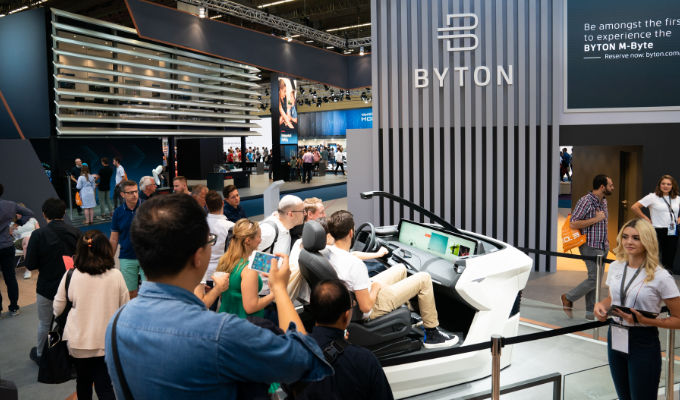Electric vehicle manufacturers Tesla and Byton are racing toward what will likely be a pivotal end to 2019 in their war for dominance of the high-end rechargeable car market, in China, if not globally, and our fair city of Nanjing is finding itself smack in the middle.
In the past week, the two companies have both taken important steps toward the release of a new car, the Model 3 for Tesla and the M-Byte for Byton.
Firstly, there was Byton’s unveiling of the M-Byte, its first vehicle, at IAA Frankfurt, one of the world’s leading motor shows which closed Sunday after 10 days racking up half a million visitors. The Nanjing-based car maker attracted much attention for the design of that dubbed the “cockpit”, the M-Byte’s interior that is centred around a 48-inch-wide curved display taking the place of a traditional dashboard.
Located in the Nanjing Economic and Technological Development Zone, Byton boasts likely the most advanced production facility in Nanjing. An investment of US$1.5 billion, spent over a massive 800,000 square metres has resulted in an intelligent manufacturing base built to industry 4.0 standards.
Byton expects to deliver its first cars to the China market in the middle of 2020, with Europe and the USA in the following years. Full-scale production of the M-Byte is thought to be imminent, after 100 prototype models were built and tested.
Meanwhile, for Tesla, rumours that began circulating a week ago have now been confirmed to be true. LG Chem in Nanjing has started producing high-nickel-content batteries that shall be used to power the Tesla Model 3, to be manufactured at the new Gigafactory 3 in Shanghai. Tesla announced last month that the Gigafactory 3 is expected to start production at the end of 2019.
The batteries in question are the NCM 811 cells that have a nickel proportion of 80 percent or more, which LG Chem had previously used for electric buses. It is thought the fact that the NCM 811 cells can maximise the range of the Model 3 was instrumental in the deal between Telsa and LG Chem.
South Korean tech publication, THEELEC, writes, “The Model 3, which [is] now receiving pre-orders in China, can run 480 kilometres on a single charge for the standard model”.
Then there is also the proximity of the two plants. Only 300 kilometres separate Gigafactory 3 in Shanghai’s Pudong from local LG Chem, also located in the Nanjing Economic and Technological Development Zone.
While the outcome of the battery-powered war is uncertain, there is no doubt that these new developments will be a significant boost to the economy of Nanjing.









